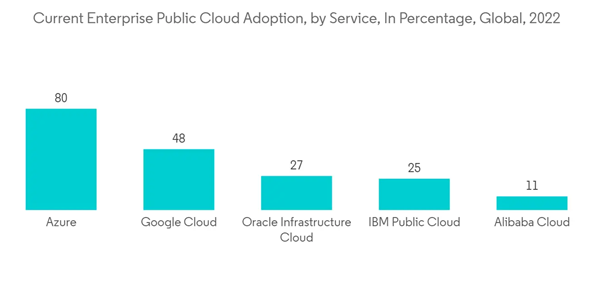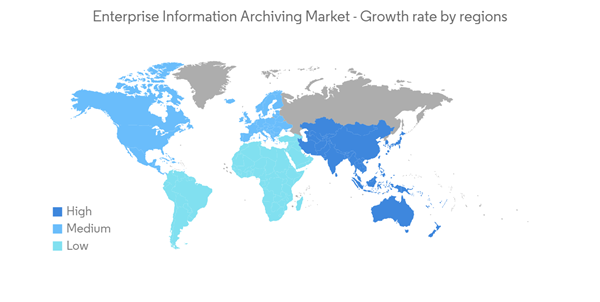The growth of enterprise information archiving solutions have been primarily attributed to the increasing data generation across various organizations with a wide geographic presence and customer base. Other factors, such as the reduced storage costs for information archiving, and the government mandates to store crucial enterprise information for audit and investigation purposes, have also been driving the growth of the market studied.
Key Highlights
- Data generated by enterprises across the globe includes majorly generated unstructured and structured data. These data are bifurcated into various formats, from structured, numeric data in traditional databases to unstructured text documents, videos, audio, e-mails, stock ticker data, and financial transactions. The enterprise information archiving solutions stores all types of data in the archive storage and then make it accessible when required. As organizations have been positioning themselves to extract more value, intelligence, and utility from the data, these solutions are expected to witness growth during the forecast period.
- In addition, increased technical innovations, modernization, and research and development efforts in the market and emerging nations would provide new opportunities for the enterprise information archiving market throughout the projection period.
- Enterprise information archiving also assisted businesses throughout the globe in automatically improving company efficiency by separating old and less valuable data on tertiary storage and storing user data on secondary storage for faster access and processing. The business information archiving industry growed significantly in recent years. Datacenters with cloud support have been constructed, allowing for scalable archiving at a minimal cost.
- One of the major factors expected to hinder the adoption of advanced enterprise information archiving solutions is a need for more training and management capabilities. Significant organizations have adopted various innovative solutions to manage their enterprise information, considering the vast digital organization information available. However, because of budget restrictions and a need for more awareness about enterprise information archiving, many businesses continue to use old and time-consuming approaches, such as manually maintaining digital information.
- With the COVID-19 outbreak, the market is likely to grow as the total data volume in the world is growing fast. According to Seagate Technology PLC, the data importance is expected to reach 149 ZB by 2024 from 26 ZB in 2017. Moreover, companies across the globe are adopting technical solutions as part of their digitalization process, augmenting market growth after the pandemic.
Enterprise Information Archiving Market Trends
Cloud Deployment Segment is Expected to Holds Major Market Share
- The emergence of cloud computing majorly impacted how businesses operate. This increasing adoption rate of cloud solutions brought changes in the operating models by reducing the cost associated with the infrastructure. The cloud-based deployment solutions enable enterprises to focus on core business competencies. There is an increase in capital expenditure for cloud services by small and medium-sized enterprises. This factor is expected to drive the market during the forecast period.
- Cloud-based solutions are expected to grow significantly due to the cost and operational benefits offered by the deployment mode. It is expected to shift the trend away from the on-premise deployment model over the forecasted period. Furthermore, in November 2021, Nasdaq and Amazon Web Services (AWS) launched a multi-year collaboration to develop the next generation of cloud-enabled infrastructure for the world's financial markets. The partnership would allow Nasdaq's North American markets to migrate to the AWS cloud, commencing in 2022 with one of Nasdaq's U.S. options markets.
- According to NASSCOM's report, global enterprise IT spending on cloud technology stood at USD 187 billion in 2018. Cloud spending is expected to reach USD 345 billion the current year. It would further create an opportunity for the market studied in the coming years.
- Several factors drive cloud adoption, including increasing efficiency, rapid deployment, and security. Because cloud providers allow clients to deploy their workloads from many locations across the globe, latency is minimized, which improves the user experience. Furthermore, cloud-based services are more robust, as the loss of a virtual machine only sometimes implies reduced service availability. To maximize advantages, companies are evaluating which cloud models are most suited to their needs and planning to adopt hybrid cloud strategies, which involve integrating both public and private clouds.
- Flexera Software said 80% of company respondents used Microsoft Azure for public cloud purposes this year. AWS, Microsoft Azure, and Google Cloud are some of the major global cloud computing platform providers known as hyperscalers.
North America to Hold Highest Market Share
- The North American region is expected to account for a significant market share. Within traditional enterprise information archiving solutions, the area is an early adopter of the latest technological advancements, such as integration technologies with A.I., cloud, and mobile technologies. Moreover, the region also includes a stronghold of information archiving vendors, such as Microsoft Corporation, Barracuda Networks Inc., Proofpoint Inc., and Smarsh Inc., among others.
- Also, the presence of governmental standards and regulations framed for various industries regarding data archiving is one of the significant growth drivers for the region, driving the market growth. For instance, FINRA's regulatory Notice 10-06 states that financial firms must retain records of all social media communications. Sarbanes-Oxley Act states that public companies must save all business records, including electronic documents and messages, for less than five years.
- Moreover, the rising cloud adoption in the region further boosts the market growth. Additionally, regional players are adopting strategic partnerships to increase their market presence. In March this year, ZNet Technologies, one of the leading global cloud and cybersecurity services distributors delivering cloud infrastructure and managed services, partnered with Acronis, a global pioneer in cyber protection in North America (USA and Canada). The collaboration combines Acronis Cyber Protect Cloud, the complete cyber security solution suite available, with ZNet's automation technology to automate invoicing and Acronis products delivery for service providers.
- Furthermore, in May this year, Barracuda Networks, Inc., one of the leading suppliers of cloud-first security solutions, expanded its cloud-native SASE platform. The SASE platform from Barracuda simplifies secure SD-WAN, firewall-as-a-service, zero-trust network access, secure web gateway capabilities, and secure access to industrial IoT devices. The extension includes new features for hybrid deployment models and IIoT contexts. New technological integrations also provide safe data transmission, orchestration, asset management, and anomaly detection.
Enterprise Information Archiving Industry Overview
The enterprise information archiving market is highly fragmented due to the presence of both global players and small and medium-sized enterprises. Moreover, enterprise information archiving is used in various industries to provide vendors with growth opportunities. Players in the market are adopting strategies such as partnerships and acquisitions to enhance their product offerings and gain sustainable competitive advantage.- November 2022: Barracuda Networks, Inc., a trusted partner and one of the leading providers of cloud-first security solutions, announced the addition of two more Azure regions for its data protection services, Sweden and Switzerland, to satisfy growing customer demand in these countries. The two areas include Gävle (Sweden) and Zurich (Switzerland North), offering users 13 Azure locations to select from for storing data backed up via Cloud-to-Cloud Backup.
- May 2022: Nokia strengthens its partnership with Microsoft to improve performance at the mission-critical industrial edge. Azure Arc capabilities on Nokia MX Industrial Edge and private wireless provide organizations with new choices for leveraging Azure in their O.T. settings. The solution adds another layer of convenience by letting organizations manage Azure workloads, including those operating on MXIE, using Azure Arc.
Additional Benefits:
- The market estimate (ME) sheet in Excel format
- 3 months of analyst support
This product will be delivered within 2 business days.
Table of Contents
Companies Mentioned (Partial List)
A selection of companies mentioned in this report includes, but is not limited to:
- Barracuda Networks, Inc
- Google LLC (Alphabet Inc.)
- Microsoft Corporation
- ZL Technologies Inc.
- Veritas Technologies LLC
- Archive 360
- Mimecast Services Limited
- Smarsh Inc.
- Proofpoint Inc.
- Global Relay Communications Inc.
- Micro Focus International PLC










